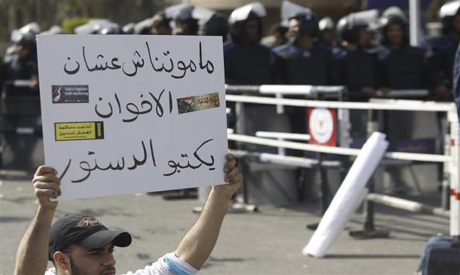
“It is unacceptable that when it is time to create a constitution, we split the country into Islamists and non-Islamists,” shouted George Ishaq, co-founder of the Kefaya Movement and member of Al-Dostour Party, as he walked down the steps at St. Mark’s Cathedral on Sunday following the inauguration of Pope Tawadros II.
In the past few months a slew of liberal and leftist representatives withdrew from the assembly, objecting to Islamist domination of the body’s proceedings. In part, they aimed to make room for more women, Christians, and young people to participate in the process.
The assembly’s refusal to consider proposals submitted by the Press Syndicate galvanized its opposition to the draft and, and also confirmed claims that were made by members who had previously withdrawn that their input was disregarded.
Although the role of religion in the draft has been under close scrutiny, it has proved to be only one of many contentious issues in the draft constitution. Human rights organizations lambasted the assembly when it removed an article on human trafficking and when it failed to address rights and protections for children.
In an October press conference hosted by a coalition against the current draft constitution, the president of the Egyptian Organization for Human Rights Hafez Abu Saada pointed to the fact that the word “torture” is not mentioned once in the draft, an omission he saw as a travesty given the revolution’s demands.
The Strong Egypt Party, headed by former presidential candidate and ex-Muslim Brotherhood member Abdel Moneim Aboul Fotouh, released a 30-page report outlining its issues with numerous articles, including those addressing presidential powers.
This past Sunday, 23 human rights organizations released a statement rejecting the current draft, claiming it reflects neither Egypt’s diversity nor its revolution.
The Constituent Assembly has managed to do what Egypt’s last parliamentary and presidential elections could not. It created an opposition against the Muslim Brotherhood that becomes more united as resistance to the draft constitution mounts. Groups within the opposition prioritize their grievances differently, but they have all managed to focus primarily on reforming the constitution and the assembly that created it, at least for now.
Ideologies stood in the way of larger non-Islamist coalitions during parliamentary elections. In the run-off stage of the presidential elections, many parties either begrudgingly chose between Ahmed Shafiq and Mohamed Morsi or didn’t choose at all.
The muffling of voices in the assembly, coupled with memories of how the parliamentary majority dealt with the minority, appear to have motivated political actors to cooperate more in upcoming parliamentary elections, and to continue applying pressure on the Constituent Assembly that lies delicately between potential dissolution by court order and withdrawal of enough members to render it incapable of passing the draft.
As public pressure continues, in an attempt to reach a consensus, Al-Azhar representatives have called for a meeting between Islamist groups, the Church, and other secular representatives that withdrew from the assembly. It appears that dissenters within the assembly will now be heard after withdrawing and finding support outside the constitution-writing body.
The future of this draft is uncertain. Articles could change as a result of deliberations before the document is finalized. The assembly could be dissolved. The current draft could be Egypt’s next constitution. Regardless of the outcome, it has created a unity among many non-Islamist parties and movements that in the past were unwilling to compromise in order to defeat a common opponent.
So while George Ishaq finds the polarization in the constituent assembly “unacceptable,” given the strictly majoritarian views of democracy of the Muslim Brotherhood, such a divide might have been necessary for now.
Basil El-Dabh is a reporter for Daily News Egypt. He graduated from Georgetown University with a Bachelor of Arts degree in Political Economy.
Photo Credit: Reuters
Image: Constitution%20Protest%20Reuters.jpg
